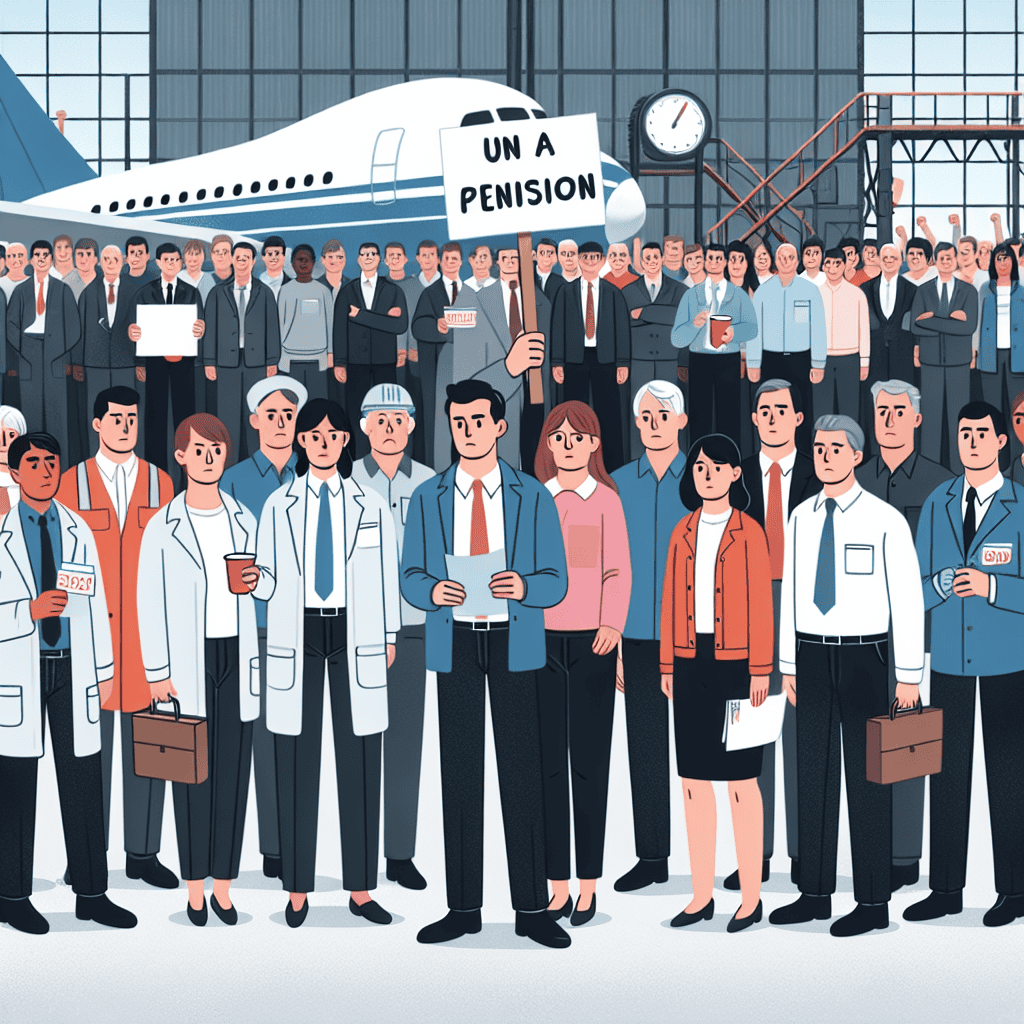“Grounded Hopes: Boeing Workers Push for Pension Revival Amid Uncertain Skies”
Introduction
Boeing workers are increasingly vocal in their demand for the revival of the company’s pension plan, a benefit that was phased out for new employees in 2014. This push comes amid growing concerns over retirement security and financial stability among the workforce. Despite the mounting pressure from employees and unions, the likelihood of Boeing reinstating the pension plan remains slim. The company, like many others in the industry, has shifted towards 401(k) plans to manage retirement benefits, citing cost control and financial sustainability. This transition reflects a broader trend in corporate America, where traditional pension plans have become less common due to their long-term financial commitments. As Boeing navigates its financial priorities and strategic goals, the workers’ call for pension revival highlights the ongoing tension between employee welfare and corporate fiscal policies.
History Of Boeing’s Pension Plans And Their Impact On Workers
Boeing’s pension plans have long been a cornerstone of the company’s employee benefits, providing financial security to thousands of workers over the decades. Historically, these plans were a significant draw for prospective employees, offering a defined benefit upon retirement that promised stability and predictability. However, the landscape of employee benefits has shifted dramatically over the years, and Boeing’s pension plans have not been immune to these changes. As workers now demand the revival of these plans, it is essential to understand the history and impact of Boeing’s pension offerings and why a revival seems unlikely.
In the mid-20th century, Boeing’s pension plans were emblematic of the era’s corporate commitment to long-term employee welfare. These defined benefit plans guaranteed a specific payout upon retirement, calculated based on factors such as salary history and years of service. For many Boeing employees, this promise of a secure retirement was a key factor in their decision to join and remain with the company. The pension plans not only provided financial security but also fostered a sense of loyalty and stability within the workforce.
However, as the economic landscape evolved, so too did the approach to employee benefits. The late 20th and early 21st centuries saw a shift from defined benefit plans to defined contribution plans, such as 401(k)s. This transition was driven by several factors, including the increasing financial burden of maintaining defined benefit plans and the desire for more predictable costs for employers. Boeing, like many other companies, gradually moved away from traditional pension plans, opting instead for retirement savings plans that placed more responsibility on employees to manage their retirement funds.
The impact of this shift on Boeing workers has been profound. While defined contribution plans offer greater flexibility and portability, they also introduce a level of uncertainty that was absent from the traditional pension model. Employees now bear the investment risk and must make critical decisions about their retirement savings, which can be daunting for those without financial expertise. This change has led to growing concerns among workers about their ability to achieve a secure retirement, prompting calls for the revival of the traditional pension plans.
Despite these demands, the likelihood of Boeing reinstating its defined benefit pension plans remains slim. The financial implications of such a move would be significant, as the company would need to allocate substantial resources to fund these plans adequately. Additionally, the broader trend in corporate America has been toward reducing long-term liabilities associated with pension plans, making a reversal of this trend unlikely. Furthermore, the regulatory environment surrounding pension plans has become increasingly complex, adding another layer of challenge to any potential revival.
In conclusion, while Boeing’s pension plans once played a crucial role in providing financial security to its workers, the shift toward defined contribution plans reflects broader economic and corporate trends. The demand for a revival of traditional pension plans underscores the ongoing concerns about retirement security among employees. However, given the financial, regulatory, and strategic considerations, it appears unlikely that Boeing will return to its previous pension model. As the company and its workers navigate this new landscape, the focus will likely remain on finding ways to enhance retirement security within the framework of defined contribution plans.
The Decline Of Pension Plans In The Aerospace Industry
In recent years, the aerospace industry has witnessed a significant shift in employee compensation structures, with a marked decline in traditional pension plans. This trend is particularly evident at Boeing, where workers have been vocal in their demands for the revival of pension plans. However, despite their efforts, the likelihood of reinstating these benefits remains slim. To understand this development, it is essential to examine the broader context of pension plan decline within the aerospace sector and the factors contributing to this change.
Historically, pension plans were a cornerstone of employee benefits in many industries, including aerospace. They provided workers with a sense of financial security, promising a stable income upon retirement. However, over the past few decades, there has been a noticeable shift away from defined benefit pension plans towards defined contribution plans, such as 401(k)s. This transition is largely driven by the financial pressures and changing economic landscape faced by companies like Boeing.
One of the primary reasons for the decline of pension plans is the increasing financial burden they impose on employers. Defined benefit plans require companies to guarantee a specific payout to retirees, which can be unpredictable and costly, especially in times of economic downturns or market volatility. In contrast, defined contribution plans shift the investment risk to employees, allowing companies to better manage their financial liabilities. This shift is particularly appealing to aerospace companies, which often operate on tight margins and face intense global competition.
Moreover, the aerospace industry has been undergoing significant changes, with technological advancements and evolving market demands reshaping the landscape. Companies are investing heavily in research and development to stay competitive, which often necessitates reallocating resources from traditional employee benefits to innovation and growth initiatives. As a result, pension plans have become less of a priority for many aerospace firms, including Boeing.
Despite these challenges, Boeing workers have been persistent in their calls for the revival of pension plans. They argue that such benefits are crucial for attracting and retaining skilled talent in a highly specialized industry. Furthermore, with an aging workforce, many employees are concerned about their financial security in retirement. However, the company’s management remains hesitant to reinstate pension plans, citing the need to remain financially agile and competitive in a rapidly changing market.
In addition to financial considerations, regulatory changes have also played a role in the decline of pension plans. Over the years, government regulations have increased the complexity and cost of maintaining defined benefit plans, prompting many companies to reconsider their viability. This regulatory environment, combined with the aforementioned financial pressures, has made it increasingly unlikely for aerospace companies to revert to traditional pension structures.
In conclusion, while Boeing workers continue to advocate for the revival of pension plans, the broader trends within the aerospace industry suggest that such a change is improbable. The shift towards defined contribution plans reflects a strategic response to financial, competitive, and regulatory challenges faced by companies in this sector. As the industry continues to evolve, it is likely that alternative forms of employee compensation and benefits will emerge, potentially offering new solutions to address the concerns of workers seeking financial security in retirement.
Boeing Workers’ Struggle For Financial Security In Retirement
In recent years, the issue of financial security in retirement has become a pressing concern for many American workers, and Boeing employees are no exception. As the aerospace giant continues to navigate a challenging economic landscape, its workers are increasingly vocal about their desire for the revival of a traditional pension plan. However, despite their demands, the likelihood of such a revival remains slim, given the broader industry trends and the company’s current financial priorities.
Historically, Boeing offered a defined benefit pension plan, which provided employees with a predictable and stable income upon retirement. This plan was a significant component of the overall compensation package, attracting skilled workers and ensuring long-term loyalty. However, in 2014, Boeing made the strategic decision to shift from a defined benefit plan to a defined contribution plan, such as a 401(k). This move mirrored a broader trend across corporate America, where companies sought to reduce their long-term financial liabilities and transfer investment risks to employees.
The transition to a defined contribution plan has left many Boeing workers feeling uncertain about their financial futures. Unlike a traditional pension, a 401(k) plan requires employees to actively manage their investments, and the ultimate retirement income is subject to market fluctuations. This shift has been particularly concerning for older employees who had planned their retirement based on the expectations of a defined benefit pension. Consequently, there has been a growing call among Boeing’s workforce for the company to reinstate the traditional pension plan.
Despite these demands, several factors make the revival of a traditional pension plan unlikely. First and foremost, the financial implications for Boeing would be substantial. Reinstating a defined benefit plan would require the company to allocate significant resources to fund future pension liabilities, which could impact its ability to invest in other critical areas such as research and development or new product lines. Additionally, the aerospace industry is currently facing numerous challenges, including supply chain disruptions and increased competition, which necessitate a focus on maintaining financial flexibility.
Moreover, the broader economic environment does not favor a return to traditional pension plans. Across various industries, companies have increasingly moved towards defined contribution plans as a means of managing costs and reducing financial risk. This shift reflects a fundamental change in how retirement benefits are structured, with an emphasis on individual responsibility rather than employer-guaranteed income. As such, Boeing’s decision to maintain its current retirement plan structure aligns with prevailing industry practices.
While the prospect of reviving a traditional pension plan appears dim, Boeing has taken steps to address employee concerns about retirement security. The company has enhanced its 401(k) offerings by providing matching contributions and offering financial planning resources to help employees make informed investment decisions. These measures aim to mitigate some of the uncertainties associated with defined contribution plans and support employees in building a secure retirement.
In conclusion, while Boeing workers’ demands for the revival of a traditional pension plan highlight the ongoing struggle for financial security in retirement, the likelihood of such a change remains low. The company’s financial priorities, coupled with industry trends, suggest that defined contribution plans will continue to be the norm. Nevertheless, Boeing’s efforts to enhance its retirement offerings demonstrate a commitment to supporting its workforce in navigating the complexities of retirement planning. As the conversation around retirement security evolves, it remains crucial for both employers and employees to adapt to the changing landscape and explore innovative solutions to ensure a stable financial future.
Comparing Pension Plans And 401(k)s: What Boeing Offers Now

In recent years, the landscape of retirement planning has undergone significant changes, with many companies shifting from traditional pension plans to 401(k) plans. This transition has sparked considerable debate, particularly among employees who have experienced the benefits of both systems. Boeing, a major player in the aerospace industry, is one such company where workers are voicing their concerns and demanding the revival of pension plans. However, the likelihood of this happening remains slim, given the broader trends in corporate retirement benefits.
To understand the current situation at Boeing, it is essential to compare the fundamental differences between pension plans and 401(k)s. Traditional pension plans, also known as defined benefit plans, promise a specific monthly benefit upon retirement. This benefit is typically calculated based on factors such as salary history and years of service. The employer bears the investment risk and is responsible for ensuring that there are sufficient funds to meet future obligations. This model provides employees with a predictable and stable income during retirement, which is why it has been highly valued by workers.
In contrast, 401(k) plans, or defined contribution plans, shift the responsibility of retirement savings to employees. Workers contribute a portion of their salary to individual accounts, often with some level of employer matching. The funds are then invested in a variety of options, such as stocks and bonds, with the ultimate retirement benefit depending on the performance of these investments. While 401(k) plans offer greater flexibility and potential for growth, they also expose employees to market risks and require them to actively manage their retirement savings.
Boeing, like many other companies, has transitioned from offering traditional pension plans to 401(k) plans for new employees. This shift reflects a broader trend in the corporate world, driven by factors such as the rising cost of pension liabilities and the desire for more predictable financial planning. For Boeing, the move to 401(k) plans allows for greater control over retirement costs and reduces the long-term financial burden associated with pension obligations.
Despite these advantages for the company, many Boeing workers are advocating for the revival of pension plans. They argue that the security and predictability of a defined benefit plan are crucial for ensuring a stable retirement. Moreover, they point out that not all employees have the financial literacy or resources to effectively manage a 401(k) plan, potentially leading to inadequate savings and financial insecurity in retirement.
However, the likelihood of Boeing reinstating pension plans is low. The shift towards 401(k) plans is not unique to Boeing but is part of a larger trend across various industries. Companies are increasingly favoring defined contribution plans due to their cost-effectiveness and the reduced financial risk they pose. Additionally, the regulatory environment and accounting standards have made it more challenging for companies to maintain traditional pension plans.
In conclusion, while Boeing workers’ demands for the revival of pension plans highlight the ongoing debate between the merits of pension plans and 401(k)s, the broader economic and corporate trends suggest that a return to traditional pension plans is unlikely. As companies continue to prioritize financial sustainability and flexibility, employees may need to adapt to the evolving retirement landscape and seek ways to maximize the benefits of 401(k) plans.
The Role Of Unions In Advocating For Boeing Workers’ Benefits
In recent years, the role of unions in advocating for workers’ benefits has become increasingly significant, particularly in industries facing rapid technological and economic changes. At the forefront of this movement are the workers of Boeing, who have been vocal in their demand for the revival of a traditional pension plan. This demand underscores a broader trend among labor unions to secure more stable and predictable retirement benefits for their members. However, despite the fervent advocacy by unions, the likelihood of Boeing reinstating a traditional pension plan remains slim, given the prevailing economic and corporate strategies.
Historically, unions have played a crucial role in negotiating benefits that ensure the financial security of workers post-retirement. For Boeing workers, the shift from a defined benefit pension plan to a defined contribution plan marked a significant change in how retirement benefits are structured. Defined benefit plans, which guarantee a specific payout upon retirement, have been largely replaced by defined contribution plans, such as 401(k)s, where the payout depends on investment performance. This shift places more risk on employees, as their retirement income is subject to market fluctuations.
The International Association of Machinists and Aerospace Workers (IAM), representing a significant portion of Boeing’s workforce, has been at the forefront of advocating for the return of the traditional pension plan. The union argues that a defined benefit plan provides a more secure and predictable retirement for workers who have dedicated years of service to the company. Moreover, they contend that such plans are a testament to the company’s commitment to its employees’ long-term welfare.
Despite these arguments, Boeing’s management has been resistant to reverting to the old pension system. The company cites several reasons for this stance, including the financial burden of maintaining a defined benefit plan in an era of increased global competition and economic uncertainty. Additionally, the shift towards defined contribution plans aligns with broader corporate trends aimed at reducing long-term liabilities and enhancing financial flexibility.
Furthermore, the economic landscape has evolved significantly, with companies prioritizing cost-cutting measures to remain competitive. In this context, the revival of a traditional pension plan appears unlikely, as it would entail substantial financial commitments that could impact Boeing’s bottom line. The company has instead focused on enhancing its defined contribution plans, offering matching contributions and financial planning resources to help employees manage their retirement savings more effectively.
While the unions continue to advocate for the revival of the pension plan, they have also recognized the need to adapt their strategies to the current economic realities. This includes negotiating for improved terms within the existing defined contribution framework, such as higher employer contributions and better investment options. Additionally, unions are increasingly focusing on broader issues that affect workers’ financial security, such as healthcare benefits and job stability.
In conclusion, while the demand for the revival of a traditional pension plan by Boeing workers highlights the critical role of unions in advocating for employee benefits, the likelihood of such a change remains uncertain. The economic and corporate dynamics that have led to the shift towards defined contribution plans are unlikely to reverse in the near future. Nevertheless, unions continue to play a vital role in negotiating for improved benefits and ensuring that workers’ voices are heard in the ongoing dialogue about their financial security.
Economic Factors Influencing Boeing’s Decision On Pension Revival
Boeing workers have recently intensified their calls for the revival of a traditional pension plan, a demand that has gained significant attention amidst ongoing discussions about employee benefits and corporate responsibility. However, the likelihood of Boeing reinstating such a plan remains slim, primarily due to a confluence of economic factors that influence the company’s decision-making process. Understanding these factors is crucial to comprehending why Boeing is hesitant to accede to the workers’ demands.
To begin with, the financial implications of reinstating a traditional pension plan are substantial. Pension plans require companies to make long-term financial commitments, which can be particularly burdensome in an industry as volatile as aerospace. Boeing, like many other corporations, has shifted towards defined contribution plans, such as 401(k)s, which transfer the investment risk from the employer to the employee. This shift allows Boeing to better manage its financial liabilities, especially in times of economic uncertainty. Reintroducing a traditional pension plan would not only increase Boeing’s financial obligations but also expose the company to greater risk, particularly if market conditions were to deteriorate.
Moreover, the competitive landscape of the aerospace industry further complicates Boeing’s decision. The company faces intense competition from rivals such as Airbus, which also operates under similar economic constraints. In this highly competitive environment, maintaining cost efficiency is paramount. Offering a traditional pension plan could potentially place Boeing at a disadvantage, as it would increase operational costs and reduce the company’s ability to invest in innovation and development. This could ultimately impact Boeing’s market position and its ability to compete effectively on a global scale.
In addition to these financial and competitive considerations, regulatory factors also play a significant role in shaping Boeing’s stance on pension revival. The regulatory environment surrounding pension plans is complex and often subject to change. Compliance with these regulations can be costly and time-consuming, further deterring companies from adopting traditional pension plans. Boeing must navigate these regulatory challenges while ensuring that it remains compliant with existing laws, which adds another layer of complexity to the decision-making process.
Furthermore, the broader economic climate cannot be ignored when analyzing Boeing’s reluctance to revive its pension plan. The aerospace industry is heavily influenced by global economic trends, including fluctuations in demand for air travel, geopolitical tensions, and changes in government defense spending. These factors can significantly impact Boeing’s revenue streams and financial stability. In such an unpredictable environment, committing to a traditional pension plan could be seen as an imprudent financial decision, potentially jeopardizing the company’s long-term sustainability.
While the workers’ demand for a pension plan revival is understandable, given the security and predictability it offers, Boeing’s decision is ultimately shaped by a myriad of economic factors. The financial burden, competitive pressures, regulatory complexities, and broader economic uncertainties all contribute to the company’s cautious approach. As Boeing continues to navigate these challenges, it remains unlikely that the company will reinstate a traditional pension plan in the near future. Instead, Boeing may focus on enhancing its existing benefits package in other ways, striving to balance employee satisfaction with financial prudence.
Case Studies: Other Companies That Revived Pension Plans And Lessons For Boeing
In recent years, the issue of pension plans has become a focal point for many workers across various industries, and Boeing employees are no exception. As they demand the revival of their pension plans, it is essential to examine case studies of other companies that have successfully reinstated such benefits. By doing so, we can glean valuable lessons that might inform Boeing’s approach, even though the likelihood of a pension plan revival remains slim.
One notable example is General Motors (GM), which faced significant financial challenges during the 2008 financial crisis. In the aftermath, GM made the difficult decision to freeze its pension plans for salaried employees. However, as the company regained financial stability, it took steps to address employee concerns by offering lump-sum buyouts and transferring some pension obligations to insurance companies. This approach allowed GM to manage its liabilities while providing employees with options, demonstrating that a creative and flexible strategy can address pension-related issues.
Similarly, IBM offers another instructive case. In the early 2000s, IBM transitioned from a traditional pension plan to a 401(k) system, sparking discontent among its workforce. However, in response to employee feedback and competitive pressures, IBM later introduced enhancements to its retirement benefits, including increased company contributions to 401(k) plans. This move underscored the importance of maintaining a competitive edge in employee benefits to attract and retain top talent, a lesson that Boeing might consider as it navigates its pension challenges.
Moreover, the case of Verizon provides further insights. In 2012, Verizon announced the transfer of $7.5 billion in pension obligations to Prudential Insurance, effectively offloading a significant portion of its pension liabilities. This decision was part of a broader strategy to reduce financial risk while ensuring that retirees continued to receive their benefits. For Boeing, exploring similar risk-transfer solutions could be a viable option, especially if the company seeks to balance financial stability with employee satisfaction.
Despite these examples, it is crucial to acknowledge the unique challenges Boeing faces. The aerospace industry is characterized by cyclical demand and significant capital investment requirements, which can strain financial resources. Consequently, reviving a traditional pension plan may not align with Boeing’s long-term financial strategy. Instead, the company might consider alternative approaches, such as enhancing its 401(k) offerings or introducing hybrid retirement plans that combine elements of both defined benefit and defined contribution systems.
Furthermore, the broader economic environment plays a significant role in shaping corporate decisions regarding pension plans. With increasing life expectancies and volatile market conditions, companies must carefully assess the sustainability of their retirement offerings. For Boeing, this means weighing the potential benefits of a pension revival against the financial risks and obligations it would entail.
In conclusion, while the demand for pension plan revival among Boeing workers is understandable, the path forward is fraught with challenges. By examining the experiences of companies like General Motors, IBM, and Verizon, Boeing can glean valuable insights into managing employee expectations and financial liabilities. However, given the unique circumstances of the aerospace industry and the broader economic landscape, a traditional pension plan revival remains unlikely. Instead, Boeing may need to explore innovative solutions that balance employee needs with financial prudence, ensuring a sustainable future for both the company and its workforce.
Q&A
1. **What are Boeing workers demanding?**
Boeing workers are demanding the revival of their pension plan.
2. **Why do Boeing workers want the pension plan revived?**
Workers believe that a pension plan provides more financial security and stability in retirement compared to other retirement savings options.
3. **What type of retirement plan do Boeing workers currently have?**
Boeing workers currently have a 401(k) retirement savings plan instead of a traditional pension plan.
4. **Why is it unlikely that Boeing will revive the pension plan?**
Reviving the pension plan is unlikely due to the high costs and financial liabilities associated with maintaining a defined benefit pension plan.
5. **How have changes in retirement plans affected Boeing workers?**
The shift from pension plans to 401(k) plans has placed more responsibility on workers to manage their retirement savings and investment risks.
6. **What are the financial implications for Boeing if they were to reinstate the pension plan?**
Reinstating the pension plan would significantly increase Boeing’s financial obligations and liabilities, impacting their financial stability and profitability.
7. **Have there been any negotiations or discussions between Boeing and its workers regarding the pension plan?**
There have been discussions and demands from workers and unions, but no significant progress or agreement has been reached to reinstate the pension plan.
Conclusion
Boeing workers have been advocating for the revival of their pension plan, a benefit that was previously phased out in favor of 401(k) plans. The demand for reinstating the pension plan stems from concerns over financial security in retirement, as traditional pensions typically offer more predictable income compared to market-dependent 401(k)s. However, the likelihood of Boeing reinstating the pension plan is low due to several factors. The shift away from pensions is part of a broader trend in corporate America aimed at reducing long-term financial liabilities and costs associated with managing pension funds. Additionally, Boeing’s financial challenges, including those related to the 737 MAX crisis and the impact of the COVID-19 pandemic on the aviation industry, make it financially impractical for the company to take on the additional burden of a pension plan. Consequently, while the workers’ demands highlight important issues regarding retirement security, the economic and strategic realities facing Boeing suggest that a revival of the pension plan is improbable.





